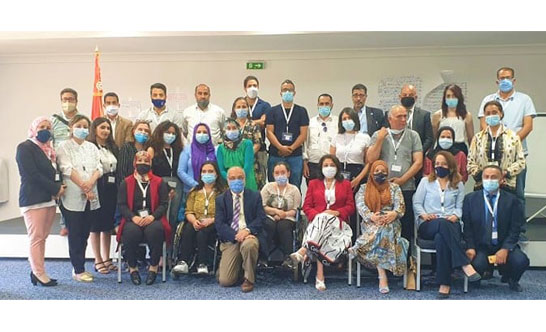Zoom On
The implementation of the Convention on the Rights of Persons with Disabilities in Tunisia.

Promotion of the rights of persons with disabilities and their inclusion
The promotion of the rights of persons with disabilities and their inclusion in all sectors is part of a perspective to meet the Sustainable Development Goals (SDGs) and to ensure fundamental principles of equality and non-discrimination, through the respect of human rights and dignity, especially when it comes to vulnerable people.
Adopted by the UN in 2006 and ratified by Tunisia in 2008, the Convention on the Rights of Persons with Disabilities (CRPD) aims to protect and to ensure respect of the rights and fundamental freedoms related to disability.
These rights are also guaranteed in the Tunisian Constitution of January 27, 2014 in Article 48, however their application remains insufficient considering the political and socio-economical context that developing countries are facing.
As part of the Tunisian government's commitment to involve human rights mechanisms more effectively in the process of promoting, protecting and implementing these rights, particularly for the benefit of persons with disabilities, a joint project to strengthen the implementation of the Convention on the Rights of Persons with Disabilities (CRPD) has been submitted to the Joint United Nations Program for the Promotion of the Rights of Persons with Disabilities (UNPRPD).
The United Nations Partnership to promote the Rights of Persons with Disabilities (UNPRPD) is a participatory initiative that brings together a number of United Nations organizations, governments, organizations of persons with disabilities and members of civil society. It aims to promote the implementation of the rights enshrined in the Convention on the Rights of Persons with Disabilities and the disability-sensitive Sustainable Development Goals (SDGs). Since its inception in 2012, the program has implemented more than 49 joint programs in 39 countries around the world, with funding of nearly US$40 million.
The project aims to strengthen the efforts of public and private actors at the national level in integrating a comprehensive, inclusive and participatory human rights approach into national policies and programs to improve access to disability related rights and services. The project also aims to redefine priorities at the state level and identify systemic gaps in order to address them, and therefore ensure that no one is left behind and that everyone can realize its fundamental rights.
During the inception phase of the project, implemented in Tunisia by 4 UN agencies (UNFPA, OHCHR, UNESCO and UNDP), the Ministry of Social Affairs and the IBSAR Association for Leisure and Culture for the Blind and Visually Impaired, a training workshop was held to strengthen the knowledge of key national actors on the convention and the principles to be integrated for a human rights comprehensive approach. Participants were representatives from key ministries, parliament, civil society organizations and organizations of persons with disabilities. The workshop was an opportunity to foster exchange and dialogue among the actors involved and to move forward with the situational analysis, which is the second step of the inception phase. The situational analysis is an inventory of the national situation related to the realization of the rights of persons with disabilities, which will be used to define the priorities and gaps to be filled through the project. The third step consists of developing the project and its detailed framework by defining the priorities, needs and actions to be undertaken at the national level to ensure better implementation of the Convention on the Rights of Persons with Disabilities through inclusive strategic planning.
To achieve the expected results, five key priorities will guide the project proposal, including the right to inclusive legislation, inclusive information, inclusive services, participation in decision-making and the communication for change.
